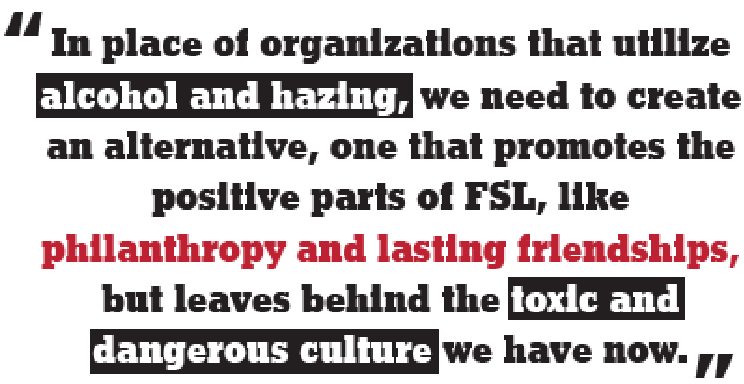It’s time to fix our fraternities
February 13, 2019
Our campus suffered a tragic loss Feb. 2 with the death of first-year Connor Gage. Following a night at two fraternities, Gage died in the snow of a North Winooski Ave. parking lot.
When a student dies, it impacts campus and our community — especially since this situation was entirely preventable. Had someone been with Gage at the time of his death, he could have gotten home safe.
But this is about more than watching out for each other. Yes, we’ll all rethink walking home alone at night or leaving a party unaccompanied after too many drinks.
Gage’s death is a call to look out for everyone, but it also brings up the need to reexamine campus culture.
We must acknowledge the role fraternities play in our community. Not all of these organizations are bad, but their actions have created a concerning pattern which recently impacted our University with Gage’s death.
How many more students will die before we fix the greek system, or eliminate it altogether?
Timothy Piazza, a Penn State sophomore, died the same day as Gage two years ago after a night of toxic hazing at his fraternity.
That same year, 20-year-old Andrew Coffey died after attending a party at the fraternity he was pledging at Florida State University.
Just last month, 18-year-old Noah Domingo was found dead in an off-campus fraternity house at the University of California Irvine.
These three men are a fraction of the hundreds who have died in similar circumstances.
If a fraternity is about brotherhood, Gage’s supposed brothers should have looked out for him the night of his death.
Fraternity and Sorority Life does its share of good for the community, like raising over $100,000 in philanthropy last year. But when incidents like Gage’s death occur, these efforts are overlooked in the wake of tragedy.
In place of organizations that facilitate drinking and hazing, we need to create an alternative, one that promotes the positive parts of FSL, like philanthropy and lasting friendships, but leaves behind the toxic and dangerous culture we have now.
Fraternities must be held accountable, whether its internally by recognizing their own actions, or by the University.
If so many deaths have been linked to these organizations, there is no excuse for them to continue to operate the way they do.
Staff editorials officially reflect the views of the Vermont Cynic. Signed opinion pieces and columns do not necessarily do so.
The Cynic accepts letters in response to anything you see printed as well as any issues of interest in the community. Please limit letters to 350 words. The Cynic reserves the right to edit letters for length and grammar. lease send letters to opinion@vtcynic.com.








Jeff Belodoff • Feb 14, 2019 at 3:12 pm
I lived in three different college towns for a total of 45 years and observed these nefarious organizations at work. Colleges and universities should not recognize them or allow them to function on campus. Encourage the local authorities to prosecute them for the deaths, rapes. assualts, intimidation, vandalism, and other crimes they commit to the fullest extent possible.
I don’t know where the six deaths a year figure came from but that is less than half of the actual figure. For anyone interested, I suggest a you do a search on frat death on a search engine. Further, not all frat related deaths are reported as such. Just 10 miles from where I live, a mother was killed and her family injured by a car full of drunk frat members returning from a frat function. Even closer to me, frat pledge was killed after being hit by a drunk driver when on a pledging activity at 4:00am and being run down the center of a street. Neither of these were considered “frat deaths.”
Mike • Feb 13, 2019 at 7:44 pm
Sadly over 260 college students die each school year on campuses from all causes with accidental and suicide at the top. Frat deaths only contribute to 6 of these deaths annually. The bottom line is each student is responsible for their own actions.